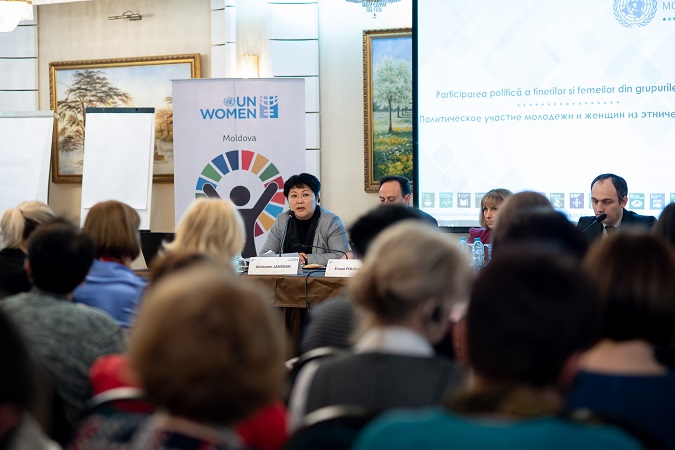Women from different ethnic groups are publicly appealing to the Government for genuine gender equality
Date:

85 women from different ethnic communities launched a resolution today, November 14, in Chișinău, at the national conference "Participation of young people and women from ethnic groups in decision-making processes", proposing solutions for the Government of Moldova that would help to ensure participation and representation of women in political and decision-making processes.
More specifically, after having conducted regional public consultations in October in Anenii Noi, Ștefan Vodă and Bălți cities, 128 women of different ethnicities, ages and professional backgrounds found that gender inequalities still represent a major problem. "Women generally have lower incomes, limited opportunities for personal and professional development and are involved far less than men in decision-making processes," was stated in the resolution.
Dafina Gercheva, UN Resident Coordinator and UNDP Resident Representative, stated: „Significant progress has already been made towards strengthening the capacity of women and youth from various ethnic and minority groups to engage in national and local politics and build an equitable society. I would like to take this opportunity and commend the Government, women’s groups and other partners for their strong support to this agenda and generous contribution. However, I would also like to highlight that this is an unfinished business and many challenges lay ahead. By way of concluding, I want to assure you that the UN stands ready to continue partnering and working with the Government, women’s organizations, other stakeholders and development actors on promoting and protecting human rights, including the rights of women and youth.”

Ulziisuren Jamsran, UN Women Moldova country representative: "Today's event is a culminating one, and it offers the word to everyone present here, to many women and young people in the localities, communities, and the regions that you are coming from. During the regional events, I did not only hear the claims on what you need, but also claims regarding what you are ready to do, and proposals on how women could actively get involved in political processes and the development of the country, and this I believe is one of the most valuable things".
Therefore, it has been found that for a more active involvement of women, the modification of legislation regarding facilitation to open creches in the existing education institutions or in other available public budgets, is an essential requirement. “Another prerequisite is the development of training programs on entrepreneurship, the creation of an information network regarding women's business financing opportunities, especially in rural areas. Moreover, it is necessary to promote digital literacy and the participation of women and girls in education and training in the IT sector," mentioned Liliana Palihovici, facilitator of regional public consultations.
Alin Gvidiani, Deputy Head of Reintegration Policy Bureau: “Our office deals with some areas related to the issues discussed today and this role has been decisive in the creation of a working group that has drawn up an action plan on the role of women, peace and security. In order to accomplish this task, together with our external partners, we have managed to test this plan. Thus, 34 actual measures were proposed, and 11 of them were planned for 2018. Within this program there were established the problems faced by women, and one of the actual examples was the increase in the representation of women by reducing discrimination.”
In addition, a major issue that was discussed during the consultations was the very low participation of women in decision-making processes. One of the proposed solutions in this sense was to initiate joint programmes between the public authorities and the civil society and at the same time to adjust the regulatory framework to ensure compliance with national legislation on women’s representation in decision-making processes.
Erwan Pouchous, senior policy coordinator of political issues within the UN Department of Political Affairs: “Our department provides support to facilitate the participation of women representing different minorities, so that they could become more involved in decision-making. These issues have been given priority on the UN agenda and have been promoted by the UN leadership. In the case of Moldova, women's representativeness is rather precarious. In 2015, Moldova ranked 64th in the world in terms of women's representation in the Parliament. Thus, we hope that the organization of such events will lead to a better involvement of women in political and civic processes in the country. The participation of women, youth, representatives of minorities is not just a right of these groups, but an increased advantage for the country.”
At the events in the northern, central and southern parts of the country, the issue of discrimination and violence against women was also addressed. Participants supported the need to develop a toolkit that would eliminate discrimination in the employment process and/or dismissal of young people and of older women, to develop legislative and administrative tools to eliminate wage gaps for the same amount of work done by women and men, as well as to increase wages in the social areas which are predominantly occupied by women, such as education, health and social services.
Regional public consultations brought together women, including representatives of various ethnic communities, who proposed solutions to ensure women's participation and representation in political and decision-making processes, and to achieve a higher level of social cohesion in the country.
The consultative events, as well as the national conference, are implemented by UN Women Moldova, in partnership with the Institute for Strategic Initiatives, and are funded by the UN Department of Political Affairs.